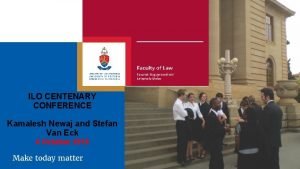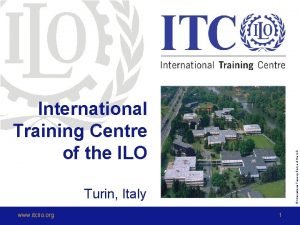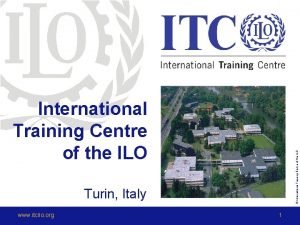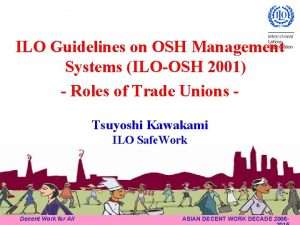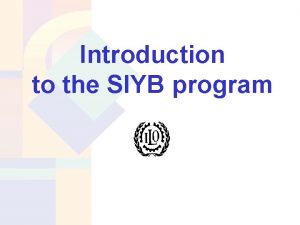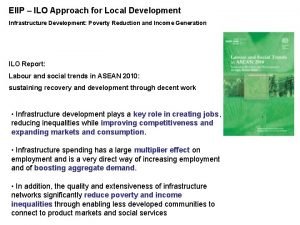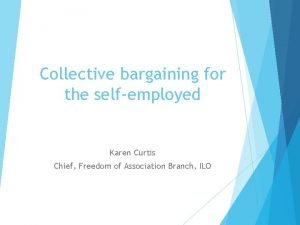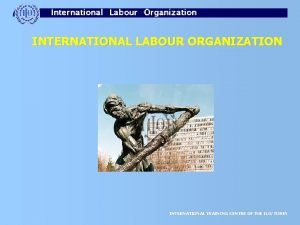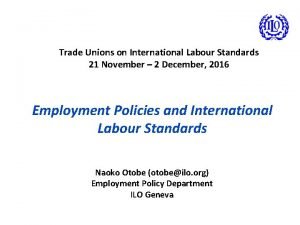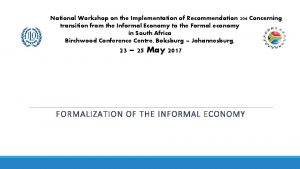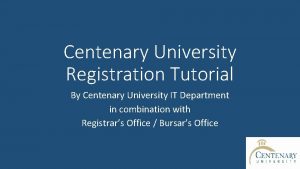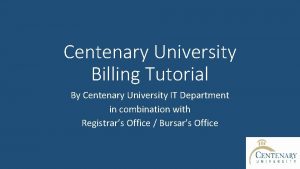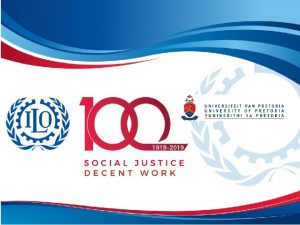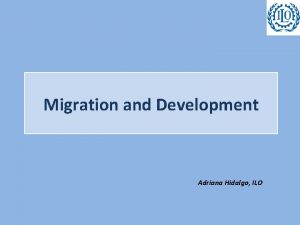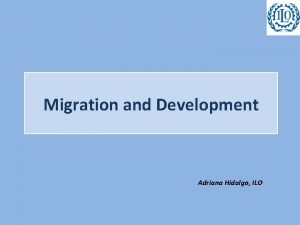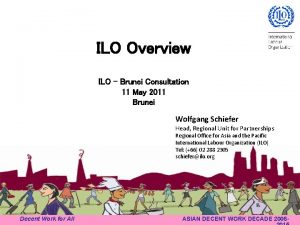ILO CENTENARY CONFERENCE Kamalesh Newaj and Stefan Van




















- Slides: 20

ILO CENTENARY CONFERENCE Kamalesh Newaj and Stefan Van Eck 4 October 2019

Rights of minority trade unions: perspectives from the ILO and CC

LEGISLATION q Constitution provides for Labour Relations Rights q Worker has right to form and join trade union and participate in activities of trade union q Every trade union has the right to organize q Every trade union and employer has the right to engage in collective bargaining q National Legislation: Labour Relations Act (LRA) q Chapter 2: No limitation on freedom of association q Chapter 3: Provision of organizational rights to trade unions, but subject to limitations

LEGISLATION q Why are organizational rights important? q Who are entitled to these rights? q Representative trade unions: Majority and sufficiently representative q Minority trade unions excluded q Ties in with majoritarian system advocated for in LRA q Where does this leave minority trade unions? q Right of minority trade unions considered by the Constitutional Court (CC) in Police & Prisons Civil Rights Union v SA Correctional Services Workers Union & others

FACTS q Issue in dispute: Can employer and minority trade union engage in collective bargaining over the awarding of organisational rights? q In this instance there was already a collective agreement in place with a majority union in terms of section 18 of the LRA, which prescribes the threshold of representativeness required to be met by trade unions in order to acquire certain organisational rights. Section 18(1) states: ‘An employer and a registered trade union whose members are a majority of the employees employed by that employer in a workplace, or the parties to a bargaining council, may conclude a collective agreement establishing a threshold of representativeness required in respect of one or more of the organisational rights referred to in sections 12, 13 and 15. ’

FACTS q Despite threshold agreement with majority (where 9000 members was set as threshold to obtain section 12, 13 and 15 rights), the employer (Dpt of Correctional Services) granted a minority union (SA Correctional Services Workers Union – SACOSWU) the right to represent their members at disciplinary and grievance proceedings, as well as the deduction of trade union subscriptions. q The majority union (POPCRU) challenged this.

INTERPRETATION q Case turned on interpretation of Section 18 and 20 of the LRA q Sec 18: Promotes majoritarianism q Sec 20 states that ‘nothing in this Part precludes the conclusion of a collective agreement that regulates organisational rights’ q Does section 20 permit the conclusion of collective agreements between employers and minority trade unions, despite the existence of a threshold agreement with a majority union?

DECISION q Victory for minority trade unions: Collective bargaining and the conclusion of collective agreements permissible q Reliance placed on section 39(2) of the Constitution which requires that the objects of the Bill of Rights be promoted when interpreting legislation q Court emphasised the importance of interpreting the LRA in a purposive manner which avoids limitation of constitutional rights q ‘Any statutory provision that prevents a trade union from bargaining on behalf of its members or forbidding it from representing them in disciplinary and grievance proceedings would limit rights in the Bill of Rights. Forcing workers who belong to one trade union to be represented by a rival union at disciplinary hearings seriously undermines their right to freedom of association described earlier’.

DECISION q Decision reached despite amendments to the LRA in 2014. q Section 21(8 C), allows a minority union that does not meet the threshold of representativeness set out in a section 18 threshold agreement to acquire section 12, 13 and 15 organisational rights through arbitration. q These organisational rights can be awarded to a minority union provided that certain requirements are complied with. q CC found that despite these amendments minority unions still have the right to bargain with the employer to be afforded organisational rights. q In other words 21(8 C) merely provides additional recourse to minority unions, but does not take away their right to collective bargaining to obtain such rights: (they have more than 1 avenue)

DECISION q Placed a lot of emphasis on a much earlier decision of the CC. q National Union of Metalworkers of SA & others v Bader Bop (Pty) Ltd & another (2005) : Here employer refused to grant a minority union the organisational right to elect shop stewards and union gave notice of intention to strike q Question: Are minority trade unions entitled to strike to gain statutory organisational rights? q Decision: Yes q Basis for decision: q As starting point CC highlighted fact that first purpose of the LRA is to give effect to constitutional rights. Secondly, the LRA should give legislative effect to South Africa’s obligations arising from the ratification of ILO conventions.

DECISION q International obligations of great importance in interpretation of the LRA. Significant principle of freedom of association states that workers ‘without distinction whatsoever’ shall have the right to ‘establish and join organisations of their own choosing’. q This does not mean that trade union pluralism is mandatory, but in order for majoritarian system to be compatible with freedom of association, minority unions must be allowed to exist, to organise members, to represent members in relation to individual grievances and to seek to challenge majority unions from time to time. q Nothing in LRA expressly states that unions which admit that they do not meet the requisite threshold membership levels are prevented from using the ordinary processes of collective bargaining and industrial action to persuade employers to grant them organisational rights.

ARE THE JUDGEMENTS ALIGNED? q No doubt that decision in SACOSWU accords with approach followed in Bader Bop. q Although the 2 cases did not deal with exactly the same facts, following is evident from these 2 judgments: q minority union can bargain with an employer to acquire organisational rights. This is irrespective of the existence of a section 18 threshold agreement and is an avenue that can be followed despite section 21(8 C). q If collective bargaining process is successful, collective agreement can be entered into. q If collective bargaining process is unsuccessful, minority union has right to embark on a strike to try to acquire the organisational rights that it seeks.

IMPACT ON A MAJORITARIAN SYSTEM q Did not depose the principle of majoritarianism. Instead, adopted purposive interpretation of LRA to reconcile this principle with the right to freedom of association through reliance on international law. q However, the co-existence of section 18 and 20 creates an uneasy situation. q Section 20 basically defeats the principle of majoritarianism provided for in section 18. What is the value of giving majority unions the power to conclude threshold agreements if a minority union equally has the right to conclude a separate collective agreement with the same employer that circumvents the threshold agreement’s purpose. q It seems that the problem lies in the wording of the LRA.

ANOTHER RELEVANT CC JUDGMENT q Association of Mineworkers and Construction Union v Chamber of Mines (2017): Also dealt with right of minority union to strike but not to acquire organisational rights. q Strike over wage increase. Minority union (AMCU) disagreed with wage increase despite there being a collective agreement in place concluded between majority union and employer. AMCU gave notice to strike, even though LRA prohibits strike action if collective agreement contains no strike clause, which was the case here. q Question: Was AMCU’s right to strike restricted by the collective agreement? This was dependent on whether AMCU was bound by the collective agreement.

ANOTHER RELEVANT CC JUDGMENT q It is common cause that section 23(1)(d) permits collective agreements to bind employees who are not members of the trade union/s that are party to the agreement if that trade union/s are the majority union in the workplace. (Must be noted that employer operated more than 1 mine and AMCU had majority membership at some of the mines but not majority at all mines together). q AMCU argued that 23(1)(d) is constitutionally invalid as it infringes workers right to strike. q Further argued that definition of workplace must be accorded a broad meaning so that each of the mines where employees render services is regarded as a separate workplace.

ANOTHER RELEVANT CC JUDGMENT Definition of Workplace Place or places where employees of employer work. If employer carries on or conducts 2 or more operations that are independent of one another by reason of size, function or organisation, the place or places where employees work in connection with each independent operation, constitutes the workplace for that operation.

ANOTHER RELEVANT CC JUDGMENT q DECISION q Even though section 23 has the effect of limiting right to strike, limitation is justifiable as it promotes principle of majoritarianism which benefits orderly collective bargaining. q Interpreted the “place or places” to mean all places where employees collectively work. q Although there was more than 1 mine this did not constitute independent workplaces as each individual mining house shared the same financial, information technology and human resource systems and operated in integral fashion, constituting a single workplace.

COMPARISON IN APPROACH q While all 3 cases dealt with rights of minority trade unions, SACOSWU and Bader Bop focused on right to freedom of association, while Chamber of Mines on right to collective bargaining. q SACOSWU and Bader Bop willing to interpret the LRA in a manner that protected rights of minority trade unions. Chamber of Mines, not persuaded to leave room for minority trade unions in its interpretation of the LRA. Court accepted that rights to engage in collective bargaining and to strike could be trumped on grounds of orderly collective bargaining. q Difference in approach: but can be attributable to the two different fundamental rights dealt with, so not necessarily incompatible. q None of the cases wrongly decided in context of current wording of LRA.

PROPOSED SOLUTION q LRA restructured: q There should be no thresholds to acquire organisational rights. q. Employees have the right to freedom of association flowing from both the Constitution and LRA, meaning that they are free to join the union of their choice. q. However, prejudiced if they join a minority union, as that union will not be allowed to represent them at disciplinary and grievance matters. q. The fact that minority unions are not automatically afforded organisational rights diminishes right to freedom of association. q If such an approach is followed no need for provisions such as sections 18, 20, 21, which have been the subject of debate.

PROPOSED SOLUTION q This does not mean that principle of majoritarianism falls away, but that it exists in a manner that respects the right to freedom of association. q Majoritarianism important in the collective bargaining process. q Would be chaotic if terms and conditions of employment had to be negotiated with all unions who represented employees of the employer. q However, there should be stricter requirements in place for the extension of collective agreements to non-parties.
 Stefan van eck
Stefan van eck Centro internazionale di formazione dell'ilo
Centro internazionale di formazione dell'ilo Ilo turin
Ilo turin Where is the international training centre
Where is the international training centre Ilo-osh 2001
Ilo-osh 2001 Chest abnormalities
Chest abnormalities Ilo classification of pneumoconiosis
Ilo classification of pneumoconiosis 4 pillars of decent work
4 pillars of decent work Siyb training modules
Siyb training modules Lernde
Lernde Eiip
Eiip Ilo house style manual
Ilo house style manual Karen curtis ilo
Karen curtis ilo Supervisory mechanism of ilo
Supervisory mechanism of ilo International training center of the ilo
International training center of the ilo Ilo.org
Ilo.org Ilo
Ilo Objectives of ilo
Objectives of ilo Structure of ilo
Structure of ilo Hbr(ac) nomenclatura
Hbr(ac) nomenclatura Ilo
Ilo
